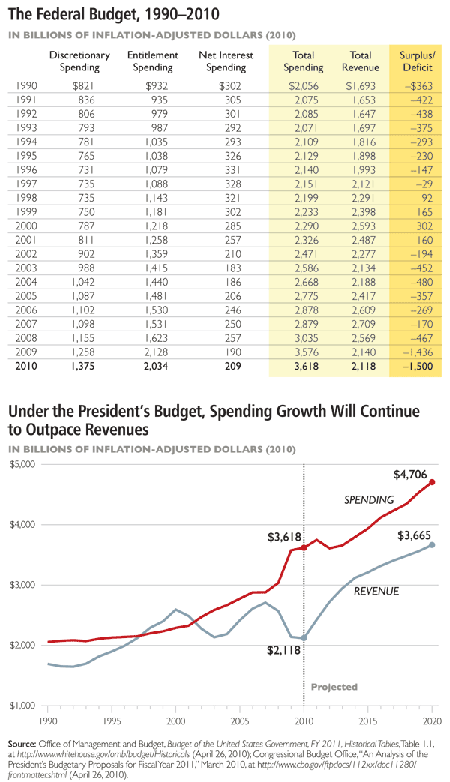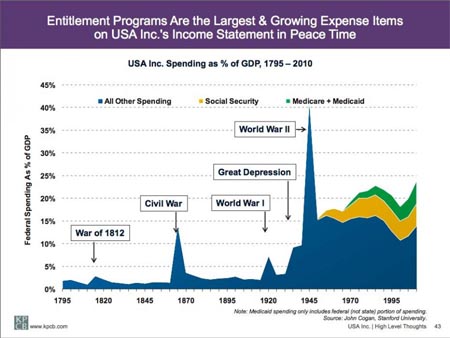Creativity
Societies die when they lose creative goals in common.
A creative goal involves making new things: building a society, becoming the best culture one can imagine, inventing new ideas or methods, or just fulfilling a cultural mandate. It is the opposite of the competitive society, where there is no goal and so the citizens compete for existing things.
As a society ages, it supports a number of people who are unable to conceptualize, plan or execute creative goals (even small ones). These people have only one role: as employees following orders. Even if they work in “creative” fields, these are those who use already existing knowledge.
Over time, these people thrive under the leadership of the creative. At some point, however, a popular uprising deposes the role of those leaders. It may be they got a bad leader or, more likely, the people who could not be creative overthrew the creative out of spite and resentment.
The result is a society divided over its future: does it aim for self-discipline and making new things, or focus on the different ways to divide up what it already has?
The group of lawmakers who participated in negotiations led by Vice President Joe Biden have already identified more than $1 trillion in budget cuts.
Republicans want far more.
But already, $1 trillion in cuts is entering uncharted territory. The cuts would be some of the biggest in history. – CNN
The Republicans have perceived that America has a sick addiction to spending. If we want a future, we need to cut spending because otherwise, we will become inward-looking: all of our money and efforts will go toward maintaining what we do have, in a losing battle against debt.
Instead, we should cut costs, cut government, cut social programs and re-invest our cash into developing new industries, technologies and more efficient ways of having industry. Among other things, we could create a green industries boom, if new technologies are invented in that process.
Our Democratic friends would rather that we stop looking toward the future, and instead become more focused on how we redistribute money through our citizenry.
“I’ve said to some of the Republican leaders, you go talk to your constituents, the Republican constituents, and ask them are they willing to compromise their kids’ safety so that some corporate jet owner continues to get a tax break,” Obama said. “And I’m pretty sure what the answer would be.”
Obama’s solution is a populist one, meaning that it sounds good to the greatest number of people.
He is echoing an old Democratic line: raise taxes on corporations and the rich.
However, he is ignoring why we keep such taxes low in the first place. We want to encourage the money to stay in our nation and invest in it. We want that money to be re-applied to development.
Even rich people serve a public interest by in many cases owning large estates covered with forest, which they keep in mostly pristine state.
If we tax too much, we will drive those corporations away from our shores, encouraging outsourcing and offshoring.
Ending the tax break for owners of private jets, for instance, would only save a few billion dollars, hardly enough to fund the Food and Drug Administration.
“I understand the populist appeal,” Sawhill said. “But those numbers are very small.”
The Democrats are working the mob into a frenzy: “Go get those rich bastards!”
The truth is that taxing the “rich” will not close the hole. Not even increased corporate taxes will. We will merely drive those people into keeping their wealth elsewhere. (The target group, those who earn over $250,000 per year, are upper half of middle class at this point, in the age of cheap money with little backing it. They are not “wealthy” in the practical sense of not needing to work.)
We cannot beat this debt by greater taxation. Further, greater taxation sabotages our economy, making the debt more painful as our currency devalues.
Other spending categories that have grown rapidly since 2000 include: anti-poverty programs (89 percent faster than inflation), K–12 education (219 percent), veterans spending (107 percent), and Medicare (81 percent). And despite all the pressing national priorities, lawmakers approved over 9,000 earmarks last year at a cost of $16.5 billion.
[…]
Of course, not all future spending is inevitable. In the 1980s and 1990s, Washington consistently spent $21,000 per household (adjusted for inflation). Simply returning to that level would balance the budget by 2012 without any tax hikes.
[…]
An additional graph shows the changing composition of federal spending since 1962, as entitlements have crowded out defense. – Heritage
Looking at the image above, we see one thing clearly: entitlement spending has risen dramatically since the rise of Democratic power in the 1990s.
Even more, government spending on its citizens has been the fastest-rising area of spending since 1950. If you hear people talking about Keynesianism, you are seeing it in action here.
Keynes wrote his magnum opus (General Theory of Employment, Interest and Money ) in 1936, in the midst of the Great Depression. People were just beginning to learn that rampant speculation could, indeed, cause the economy to collapse. Keynes proposed government as a debt sink that regulated the value of currency by spending vast amounts to keep the economy going.
Up until recently, people thought Keynes was correct. He may in fact be correct; however, he may have underestimated the secondary consequences of Keynesian economics, namely that they like Socialism cause a leveling of worth and thus a kind of monetary entropy, where all investments become somewhat random and thus vast instability prevails.
In the meantime, his influence has caused government to balloon and even more, for entitlement spending (the opposite of “discretionary spending” such as the military) to explode, all of it being spending by the government on its citizens, including welfare, healthcare, education, and other big expenses that were virtually unknown before 1950.
Image from Business Insider.
Tax the rich? Cut defense? Tax corporations? These are fake answers designed to keep idiots busy thinking something is “being done,” while the real profits head out the door and are converted from our declining currency into other sources of wealth. (If you think dollars will be worthless real soon, use them to buy yen before that event.)
The real problem here is the concept of entitlement itself:
- It’s huge. Over half of the budget is entitlements. Further, it breeds more of itself, because each expenditure adds more bureaucracy, more laws, more policies and more people in both public and private sector dependent on the jobs they sponsor and the people they support. A job without profit behind it is not a “made job” but a dependent job, meaning that it does not contribute to the economy, but takes money out of it without creating more wealth for us all.
- It fails. Entitlements are ineffective at reducing the problems they claim to address. As extended government subsidies, they treat the effects but not the underlying causes; as bureaucracy, they encourage keeping people “in the system” to justify its existence. Even more, they often create more problems than they solve. Medicare engendered a vast labyrinth of regulations which many corporations and individuals take advantage of. In the meantime, more people than before have problems finding medical care.
- It corrupts our outlook. Entitlements create a mindset of gaming the system, where the idea is to get as much for yourself without necessarily adding to the collective wealth through effort and creativity. When people are subsidized, they have no incentive to add to the collective wealth, so the vast majority of people take more than they give. This creates a culture of gaming the system, where people become resentful and opportunistic. Even further, it demands that we create a dogma of justification for our gaming the system, such as “equality” or “justice,” which in turn corrupts the meaning of those terms. Entitlement culture is bad for our psychology.
If you want to be embittered, be embittered at that last item. The same culture of do-nothing that destroyed the Soviet Union now thrives in America through make-work jobs, a large entrenched bureaucracy, a huge welfare state and many incompetent people who make predictable mistakes and then expect government to bail them out.
The tendency toward gaming the system kills what is vital about a society. It corresponds to the victim mentality of 1980s teen movies: if you feel like a victim, you can in turn overthrow those above you and force them to give up their power, wealth and popularity. However, you’re still the person who could not create those things in the first place.
Entitlement culture savages these things:
- Values. If we all deserve subsidy for being human alone, there is no way we can make choices about what values we want in our towns and cities. Instead, we must accept everyone, and accept that everyone now has money to spend however they see fit, even if it’s crazy. This forces us all to accept crazy, and we’re supposed to smile about it.
- Natural selection. In a healthy society people are rewarded for being exceptionally good, and everyone else is tolerated unless incompetent, but incompetents are thrown out for being useless (traditionally, in America we’ve run our incompetents off to Mexico or Canada, who wised up and started sending them back with interest). When you introduce the subsidy, everyone is guaranteed survival, which specifically helps the incompetents (everyone else would have survived anyway). As a result, you have a huge population boom in the incompetent zone, propelling you further along toward Idiocracy.
- Self-reliance. When the idea that is that we all fix our own problems, and there is no subsidy waiting to descend from heaven to save us, people tend to be responsible. They get their own act together, discipline themselves, and find a path in life. When it doesn’t matter whether you’re disciplined or not, and even if you screw it all up you get the equivalent of a salary, a culture of do-nothingness is created. People just hang out, or pin their hopes on illusory dreams. Why worry? Government will save us.
- Organic society. An organic society is one that grows naturally from an agreement over values. People of like minds and abilities get together and start a new civilization up, and it grows. This type of society requires little enforcement because people generally agree on what is good behavior and what is bad. When subsidies intrude, a powerful central government is required to hand out the money and enforce good behavior. This means that a false standard has taken hold and will replace the organic one.
The above are things that we all claim to want, at least if we talk ourselves through which of the options is best. No one wants idiots — they will only admit they want natural selection when you talk them through the process like a Socratic dialogue:
Aetheryus: My society is awash in idiots!
Socrates: How do we fix that?
Aetheryus: Send them away!
Socrates: You want to give our tyrant the ability to choose who is good and who is bad?
Aetheryus: No!
Socrates: So we need another way, like some kind of test, or even a challenge.
Aetheryus: Yes!
Socrates: Like natural selection?
Aetheryus: No! Yes! No — wait, natural selection is bad, amirite?
Civilizations die when they go from cultures of creativity to cultures of internal competition. They stop striving for anything, turn inward looking, and bicker themselves to death.
Luckily, this process can be restarted. All it takes is for us to reverse the culture of gaming the system, reverse the perverse notion of equality, and rip out the dead wood and start over, this time building it to last.
Tags: crowdism, entitlements











